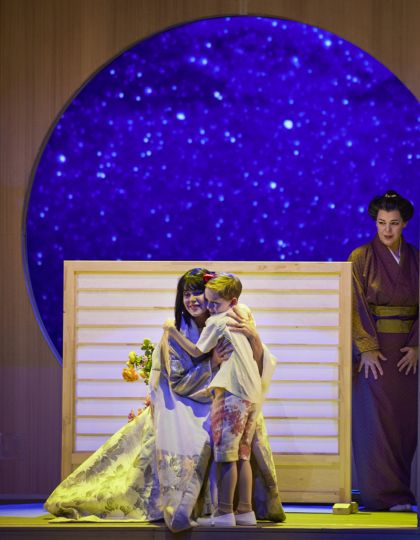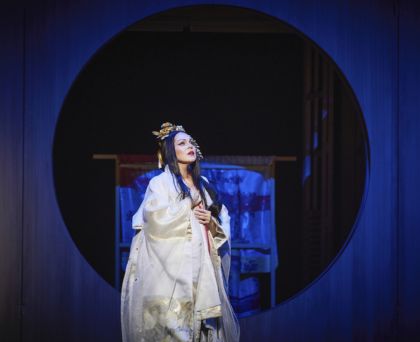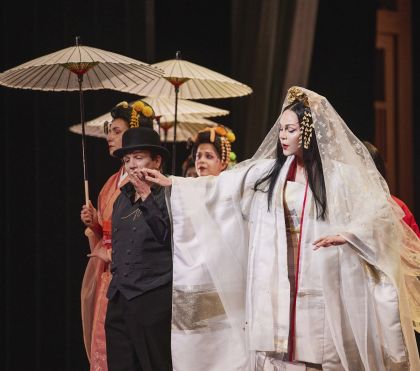After the recent Semperoper premiere of Puccini’s »Madama Butterfly«, our reviewer was left at a loss. The co-production with Tokyo, Copenhagen and San Francisco gets tangled up in restlessly raging curtains and in an unclear understanding postcolonials The debates.
In Calvinist America, pleasure that goes against reason is called guilty pleasure. This includes the tempting but unhealthy piece of chocolate as well as the film that you consume passionately but are also a bit ashamed of. Paradoxically, by publicly acknowledging one’s tasteless fondness or associated guilty pleasure, one is communicating one’s tastefulness and at the same time a trace of individual generosity.

–
It is a well-known fact that guilt and shame are part of the emotional core of drama and opera. In classical tragedy, according to Aristotle, it is the sin, the hero’s misconduct that leaves him – or more rarely, her – in misfortune. In opera, especially with Puccini, it is usually the women who suffer this fate. Just think of Tosca’s fall from Engelsburg or Madama Butterfly’s suicide. But is it her misstep that sets the tragedy in motion? There is some evidence that in Madama Butterfly Pinkerton is knowingly guilty when he enters into a marriage under Japanese law in Act I and leads Madama B. to believe they are being married as equal partners under American law. One easily misjudges the drama-theoretical cut that Puccini undertakes here with his two librettists. Madama Butterfly is anti-drama and anti-opera at the same time. Anti-drama because Madame Pinkerton is not a victim of her own mistake. Anti-opera because the conflict is not as in the serious opera thanks to one God from the machine dissolves in pleasure.
Of course, Puccini’s »Madama« also belongs to a different tradition. In the 19th century, the genre of theatrical melodramas was very popular. Likely referred to on German stages as a moral image or a drama of fate, no technical effort was spared in these spectacles. The term here would be anachronistic guilty pleasure probably appropriate. These sensational pieces were designed for the mass market and thereby undermined the status clause of high tragedy. At Puccini we have both. On the one hand, the Italian was the most economically successful composer the opera has ever seen, on the other hand, Madama Butterfly thwarts the modern equivalent of the status clause.日本人女性はあえてアメリカ人と結婚しよう – a Japanese woman dares to marry an American!
And that brings us to the heart of the problem. There is a lot of racism, colonialism and imperialism in this status clause. Around 1900, a rhetorical culture war was waged on both sides of the Atlantic under the keyword yellow peril a xenophobic horror scenario was designed in which the existence of the white race was threatened by an Asian mass that was portrayed as underdeveloped. The mastermind of Gestalt psychology, Christian von Ehrenfels, connected this with a crude social Darwinist theory and advocated the introduction of state-controlled polygamy in the “West”, in which a few “strong” men would have to have several women available as mothers of their children, in order to be able to oppose the imagined Asian “crowd”.

–
It is because of these historical constellations, which are only sketched out here, that there is a slight uneasiness about the oriental subjects of the operatic repertoire. If you take opera seriously as an art form, you should also take the concerns expressed by Miki Kaneda or Katherine Hu seriously and not hide behind bogus arguments – it was just a different time. Nor can the decorative chinoiserie or japonisms of the 1900s be absolved of the brutal history of colonialism. Both are bloodily linked.
Some people may now think that such objections can continue to be ignored in Dresden. America and its discursive reappraisal of historical racism are far away. The Semperoper, perhaps also because the new production is being created in collaboration with Tokyo, Copenhagen and San Francisco, seems to be aware of the problem. After all, she asked Amon Miyamoto, a director who is extremely successful in Japan, to develop his own view of opera in the costumes of the Japanese-French fashion star Kenzou Takada. Significantly, the House itself calls this an “eastern view” in the pre-announcement.
License to the Japanese cliché
Miyamoto stages »Madama Butterfly« as a dream image of the child treated as a mute prop in the opera. In the prologue there is an in der prepster-Young man dressed in elite American college uniform at the deathbed of his father, Benjamin Franklin Pinkerton. The father hands the son a letter that is supposed to shed light on the circumstances of the conception and the father’s guilt for the mother’s death. The son accompanies us for the rest of the evening as a silent witness or as a narrative authority. We watch him reminisce about his early childhood. We see how he sees his old home again in his mind’s eye. We see him idealizing his handsome mother and teenage father. We see how he wants to protect his young alter ego and yet can’t.

–
Theoretically, such a second-order observation should be predestined for distance and knowledge gain. The result on stage, however, is completely different. The invented background story becomes a mere license to reproduce well-known Japanese and opera clichés for the masses. The choir sings in candy-colored kimonos, kitschy cherry blossoms and bamboo forests are projected onto the back wall, Christa Mayer as Suzuki has to scurry submissively across the stage. The western costumes appear to have been borrowed from a West End production of Mary Poppins. And then there are those horrifying curtains and a self-propelled wooden pavilion that are constantly making transformations and are supposed to evoke a dream world and imagination. In reality, they are more reminiscent of a musical production.
Miyamoto escapes into a childish dream world and wants to hear a great love story in »Madama Butterfly«. Maybe similar to the son who longs for a healing memory. It’s never too late for a happy childhood! So the father rises from his deathbed and runs towards Cio-Cio, who appears in her wedding dress in the background of the stage, enraptured. It’s never too late to regret! And so Miyamoto’s staging takes back both anti-drama and anti-opera. It’s never too late for a beautiful opera! Whether this, however, as guilty pleasure goes through, I dare to doubt. The costs are too high, the blind spots too big.
It is regrettable or perhaps also logical that Puccini’s music is not available given these scenic conditions guilty pleasure want to be good. Omer Meir Wellber plays brilliantly with the Staatskapelle. The ensemble of singers is outstanding. Gabriele Viviani sings a psychologically differentiated consul on an international level. In the third act, for example, Christa Mayer manages to reveal the full emotional scope of the betrayal in just a few bars. But sometimes it’s just too late for enjoyment despite guilt.
Next performances: April 14, 18; May 1, 6, 15; June 18, 24, 2022
–


